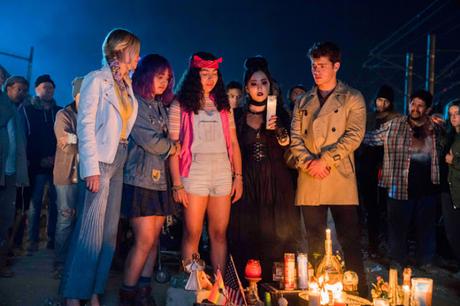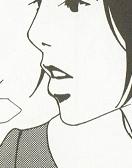
Recently, after giving the show a break after a misconceived season focusing on a character that I thought insufferable, I started watching Supergirl again. The whole season was a thinly veiled analogy of what was happening at the same time in the United States – a country descending into an authoritarian nightmare, with clever politician and media personalities stoking xenophobia against the other – in the case of Supergirl, literal aliens. The other was taking jobs away from honest, non-powered humans. The other possessed unknowable strengths and traits, and was therefore a constant threat. That other included Supergirl herself – Kara Zor-El, the closest thing that we have now to an unflinchingly, good-hearted, brave hero. I thought the season was excellent in how directly it confronted the twisted power of xenophobia, of racism, of hatred against others, but that it made a grave error when it dedicated a whole episode to its central villain. Super-villain origin stories are a staple in any super-hero tale of course, but it was hard to stomach forty-five minutes of Ben Lockwood’s tragic backstory, which turned him from an eloquently spoken professor of history and political science into a racist demagogue who employed rhetorical capabilities to create an army of ideologically motivated thugs who terrorised and brutalised their alien neighbours. The idea that his descent into this caricature of the well-dressed and -spoken nazi (what a horrible place 2017 and 2018 have been) was somehow rightfully motivated by his losses, by his traumas, was profoundly unfortunate, especially considering that the figures he is based on have been solely inspired by their fragile masculine white egos. The fact that Ben Lockwood’s story deserved an entire episode of this show that is so good at highlighting the plights of the unprivileged and marginalised voices was frustrating and sad. On the other hand, maybe the show was merely trusting its audience that it would come to the judgment that Lockwood, in a show where so many characters have suffered unspeakable losses and yet have stood up and become heroes, was even weaker because he did not take his suffering and grew stronger from it, rather than more hateful.
It’s something that I felt reminded of during the second season of Runaways, during some of its more inexplicable choices. Consider that in the books that the show is based on, the title describes the characters – they are Runaways, and for the majority of the story, from a very early point in that story, parent-less. More than that, they are shaped by their experience that parents, and more than that the authority they represent (which includes the authority of the state and the police, both of which they are at the run from also) are fallible, corrupt, and ultimately self-interested. This is not a hero-origin story, because none of the Runaways are willing heroes – when they act heroically, they do so reluctantly, as for the most part, their main concern is staying alive. Their starting point is the realisation that the people they thought they could trust, the people they thought were meant to take care of them, are not just fallible, but straight-up evil, and irredeemably so, regardless of how many of their evil acts were inspired by trying to buy their children a better world (or buying their children’s survival in a dying world).
The television show departs radically from that approach, mainly because this far into the story, all of the parents are still alive. The starting point here isn’t the realisation that parents make terrible errors and that children have to forge their own way forward and make their own determinations about ethics and morals, but that in the background to that path, the possibility of parental love and protection continues to exist. How tempting it would be for these Runaways, who are learning to live without the privilege of their parents’ riches, to return to the fold, and to truly embrace the idea that all of this – the human sacrifice, the deal with literal devils – was all for them? It’s a proposition made even more viable because the show spends so much time on redeeming and explaining the parents, ultimately only finding one of the parents irredeemable – ironically, the one who was least involved in the crimes of the Pride, the one who was found too weak to even be part of the Pride. At the end of this season of Runaways, the only parent found so wanting that he is disposed of is Frank Dean, who isn’t even a biological parent (and the fact that the show decides to side with Karolina’s biological father here, by disposing the one who brought her up, and was more loving than her mother, is another stunning thing that happens this season – adoptive parents who put in the work ARE real parents, regardless of alien heritage).
Not only are the parents still alive in this second season of Runaways, they often get whole episodes to tell their stories. As if the show didn’t fully trust its amazing cast of young actors to carry the brunt of the story, it goes back again and again to its more illustrious names to carry the story forward, even when it is at the cost of being true to the core values of its story. Why would Chase’s father, who is abusive, who is a monstrous patriarch oppressing his wife and terrorising his son, deserve a redemption arc? (And how odd to see this play out again, so many years after Buffy did the same thing to another one of James Marsters’ roles). Why does he deserve an arc at all? And why must we spend so much time, through decades, with Karolina’s biological father Jonah, and his horrifying creepy grooming of Karolina’s mother since childhood into the future mother of his daughter? Something about the perspective seems skewed, as if these forays into the parents’ stories were as valid as the current stories about their children, who try so hard to figure out how to be themselves, and be good, in a world they are navigating on their own for the first time.
Wouldn’t it have been so much more interesting, and so much more in the spirit of the books, if we had spent more time with Gert trying to figure out how to receive the mental health care she requires to function while also on the run and without the privileges of rich parents? Or more time with Nico trying to grasp her power, trying to grasp how it twists and turns her? Or of Molly, coming to terms with losing another parental figure? In all these cases, the glimpses we get – of Ariela Barer, Lyrica Okano, Allegra Acosta – shining when they are given the material to work with are glorious, and yet, there never seems to be enough time to linger among all the twists and turns of the season, and the endless amounts of hours the show wastes on Alex’ exploits into the LA underworld (and the weirdly racist story about a bad black cop, which truly is a cynical choice for a villain here). What a waste of time to spend a second on Victor Stein’s mental landscape and Jonah’s attempts to connect to his daughter. How fucking weird, to have a whole story about how unchecked the privileged can commit crimes for their own benefit because they own anything that could meaningfully hold them accountable and then to really dive into how they feel about being called out by their own children.
It’s especially frustrating considering how much good this season throws at us at the same time. There’s the beautiful twist here that Xavin (I love this weirdo who has no idea how to be on earth so much), in this version of the story, is encountering Karolina for the first time when she’s more or less happily in love with Nico, rather than figuring out her feelings for someone who won’t reciprocate for years. There’s Nico, who is already halfway to the version of Nico in Rainbow Rowell’s perfect new arc, freaked out by the powers she can’t always completely control, because sometimes they control her (and maybe she’s already halfway to the beautiful bit in that first book of Rowell’s story – “Hanging out with super heroes, she’s already cast every version of “fix this person whom I love very much” – it’s only now she realises that she can only cast each spell once, that her superpower is a lesson in finding synonyms. What I mean to say here is that it sometimes seems as if Runaways the show does not trust that these kids are perfectly capable of carrying the story by themselves, even though, through the effort of so many writers, their stories are fully formed and their struggles are captivating. Their parents errors are a lesson, as is their realisation that their parents deal meant that they grew up in a world so privileged that they now struggle to find a path without all those resources they were granted. These are their stories, and they have every right to them.

